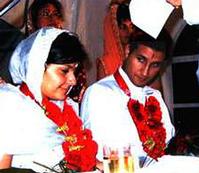|
The
Bengali Wedding Ceremony |
The
Buddhist Wedding Ceremony |

|
The traditional Bengali wedding ceremony combines Vedic
scriptures with regional traditions, Bengalis have created a
synthetic and beautiful marriage ceremony. |
 |
Buddhist wedding ceremonies are becoming increasingly popular in
the west, and are not just restricted to those who follow the faith. |
|
The
Catholic Wedding Ceremony |
The
Gujarati Wedding Ceremony |

|
A Christian wedding usually takes place in a Church, before a priest. A Christian bride traditionally wears a white gown. Her head is covered with a white veil and a bunch of white flowers crown her.
|
 |
Gujarat provides variations to the vedically prescribed Hindu
wedding. From grabbing the grooms nose to stealing the grooms shoes,
we follow the rituals. |
|
The
Hindu Wedding Ceremony |
The
Jewish Wedding Ceremony |

|
Marriage in the Hindu religion is the 13th of the 16 ceremonies in a person's life.
Marriage in the Hindu religion is the 13th of the 16 ceremonies in a person's life.
|
 |
In Jewish tradition, marriage is considered sanctification. The word for marriage, "kiddushin", is derived from the root
word, "kadosh", which means holiness. The favourite day for Jewish marriage is a Tuesday.
|
|
The
Kannada Wedding Ceremony |
The
Kashmiri Wedding Ceremony |

|
The
most notable feature of a Kannada wedding is its
simplicity. Earlier, when money and time were aplenty,
the wedding celebrations went on for at least four
days.
|
 |
Kashmiri Pundits are tradition preservers and cling on to their legacy with determination.
Kashmiri wedding apparel is a beautiful fusion of all the different traditions that have influenced Kashmir. |
|
The Marwari Wedding Ceremony |
The
Muslim Wedding Ceremony |

|
We
cover The Hindu wedding ceremony which precedes with
a 'Misri ceremony' (sugar ceremony) and ends with
a 'Datar ceremony' (salt ceremony). |
 |
Muslim weddings throughout the subcontinent have developed
specifically Asian traditions while maintaining Islamic marriage
requirements. |
|
The
Parsi Wedding Ceremony |
The
Punjabi Wedding Ceremony |

|
Parsi weddings can last for four days, with the ceremony being
performed on the evening of the last day to unite the
'var-raja'(husband-king) and his 'kanya' (bride). |
 |
Punjabi weddings build upon the strong tradition of Hindu
weddings with added elements specific to this north-western region. |
|
The
Sikh Wedding Ceremony |
The
Tamil Wedding Ceremony |

|
Sikhism represents more than the physical uniting of two families
or even two people. The Sri Guru Granth Sahib (the Sikh holy book),
says that marriage merges two souls. |
 |
Tamilian marriages are
conducted in public halls specially constructed for the purpose. As per the
Hindu calendar, barring the months of Aashad, Bhadrapad, Shunya, all other
months are considered to be auspicious for marriage. |















